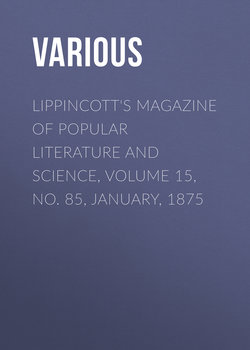Lippincott's Magazine of Popular Literature and Science, Volume 15, No. 85, January, 1875

Реклама. ООО «ЛитРес», ИНН: 7719571260.
Отрывок из книги
In leaving Cologne for Aix-la-Chapelle you turn your back to the river—a particular which suited my mood well enough. The railway bore us away from the Rhine-shore at an abrupt angle, and in my notion the noble Germanic goddess or image seemed at this point to recede with grand theatric strides, like a divinity of the stage backing away from her admirers over the billowy whirlpool of her own skirts. As I dreamed we penetrated the tunnel of Königsdorf, which is fifteen hundred yards long, and which seemed to me sufficiently protracted to contain the slumber of Barbarossa. The thought gave me a useful hint, and I fell into a light sleep, while Charles and Hohenfels pervaded the darkness merely by their perfumes—the former with whiffs at a concealed bottle of Farina, the latter with a pastille counterfeiting the incense of the cathedral. In a couple of hours from the Hôtel de Hollande we reached Aachen, as the fond natives call the burgh so dear to Charlemagne. Deprived of that magnificent mirror, the Rhine, the pretty towns throughout this part of Germany seem but like country belles. We should hardly have paused at Aix but for the sake of affording a rest to Charles, who grew worse whenever lunch-time competed with railway-time. As for the dull little city, for us it was a wilderness, with the blank cleanliness of the desert, except in so far as it was informed and populated by the memory of Charlemagne.
Here he died, and entered his tomb in the church himself had founded. Into this sepulchre the emperor Otho III. dared to penetrate in the year 997, impelled by a motive of vile and varlet-like curiosity. They say the dead monarch confronted his living visitor in the great marble chair in which he had been seated at his own command, haughty and inflexible as in life, the ivory sceptre in his ivory fingers, his white skull crowned with the diadem of gold. The peeping emperor looked upon him with awe, half afraid of the mysterious and penetrating shadows that reached forth out of his rayless eyes. Before he left, however, he peered about, touched the sceptre and the throne, fingered this and that, and having, as it were, trimmed the nails and combed the beard of the great spectre, retired with a valet's bow. Observing that Charlemagne had lost most of his nose, he caused it to be replaced in gold very delicately chiseled and enchased. The sacrilege was repeated by Frederick Barbarossa in 1165, who went farther and forced Charlemagne to get up from his chair before him. The corpse, in rising, fell in pieces, which have been dispersed through Europe as relics. We saw such of them as remain here at the Chapelle. I was allowed, for about the equivalent of an American dollar, to measure the Occidental emperor's leg—they call it his arm. And then, as a makeweight in the bargain, the venal sacristan placed in my hands the head of Charlemagne.
.....
Fortnoye now had an object in life. "There is a very young person in the cemetery of Laaken who is much in need of a chaperone," he said. The frank proofs of his own relations with this churchyard would not only do credit to his own reputation, but would gratify the best friends of Mademoiselle Joliet and at least one other lady. To attain these proofs he had to step over the coiling, writhing bodies of a whole nest of rumors. When he seized by the throat the especial slander that he himself was the husband of the babe's mother, he found written on its crest the signature of John Kranich. He sought the aunt. This lady gave him several interviews, the Lutheran prayer-book for ever in her hand. "Why does the dear girl not come to me?" she would say, weeping, but she refused to hear a word against her precious nephew, the personification of bluff frankness. As if to make crushing him impossible, young Kranich had now withdrawn to America, leaving his reputation in that best possible protection, the chivalry that is extended toward the absent. Fortnoye was baffled. "I will ask the baby at its tomb for its mother's and father's name," he cried. In the pretty God's Acre he found a fresh harvest of flowers and a new statue over the well-known grave. It was a pretty miniature of Thorwaldsen's Psyche, on which the proud copyist had inscribed his name. A respectful correspondence with Mrs. Ashburleigh, to whom he was guided by the sculptor, and who was now taking the waters at Wildbad, soon put the whole tangled story to rights. Fortnoye had the happiness of conducting Francine, by this time his affianced wife, to the good Frau Kranich, who, convinced that she had wrongly judged her, threw her arms ardently around her recovered jewel, letting the eternal little book fly from her hand like a projectile.
"But the most singular part of the story," concluded Father Joliet, "is the letter which Fortnoye, after two or three quarrels, forced out of young Kranich when the latter had returned to Europe, full of triumph and debts, to take possession of his aunt for the rest of his life. Here it is," added the good man, opening a pocket-book. "The hand-writing is drunken, but the sense is clear as Seltzer-water. The scholars tell me in vino veritas est, but it appears to me that truth really comes out in the repentance and headache that follow."
.....